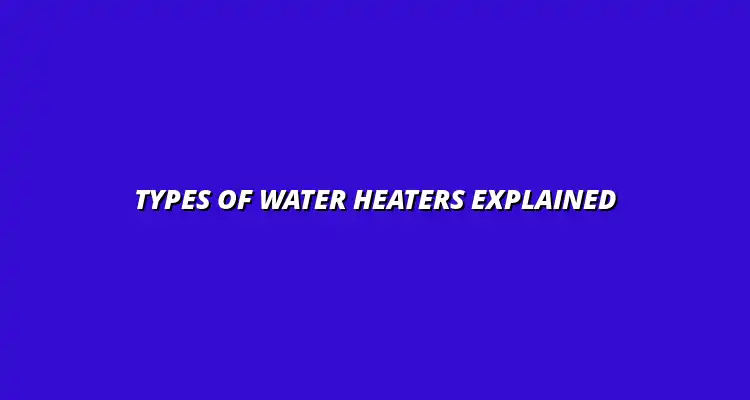
- Plumbing Basics
- Feb 17
2025-01-23
Water heaters are essential appliances in our homes. They serve the important function of providing us with hot water for various daily activities, from showering and washing dishes to doing laundry. Without a reliable water heater, our everyday routines could become quite inconvenient!
Essentially, a water heater heats water and stores it for use when needed. Depending on the type of water heater, this process can vary. However, the end goal remains the same: to supply hot water quickly and efficiently.
A water heater is a device that heats water for residential or commercial use. Depending on the heating method, it can utilize natural gas, electricity, or even solar energy. These heaters come in various types, each with unique features that cater to specific needs.
Some common types include conventional storage tank water heaters, tankless systems, and solar water heaters. Knowing what each type does helps in choosing the right one for your home!
Hot water plays a significant role in our daily lives. We rely on it for hygiene, cooking, and cleaning. Having a dependable water heater ensures that we can carry out these tasks efficiently.
Energy efficiency is crucial when it comes to water heaters. An energy-efficient model can significantly lower your utility bills and reduce environmental impact. On the other hand, a less efficient water heater can lead to higher energy costs over time.
By choosing a water heater that consumes less energy, you not only save money but also contribute to a greener planet. It’s a win-win situation!
Energy ratings help consumers make informed decisions about water heaters. These ratings are often displayed as Energy Factor (EF) or Uniform Energy Factor (UEF) on the appliance. A higher rating indicates better energy efficiency.
Understanding these ratings can help you select a water heater that meets both your needs and energy conservation goals!
When it comes to water heaters, many of us have questions. It's essential to understand how to choose the right one for our needs and how to maintain it properly. Let’s dive into some common questions to help you feel more confident in your water heater knowledge!
Choosing the correct size of a water heater is crucial for meeting your household's hot water demands. A water heater that is too small will leave you running out of hot water, while one that is too large can waste energy. Here’s how to determine the right size:
By understanding these factors, you can select a water heater that efficiently satisfies your needs without wasting energy!
Regular maintenance is key to extending the life of your water heater and ensuring it runs efficiently. Here are some essential maintenance tips:
By following these maintenance steps, you’ll help keep your water heater running smoothly for many years!
Over time, even the best water heaters may need to be replaced. Knowing the warning signs can save you from unexpected cold showers! Here are some indicators:
Recognizing these signs early can lead to timely replacements, keeping your home comfortable and safe.
Choosing the right water heater involves several considerations. It’s not just about the type or size but also about how it fits your lifestyle. Let’s explore some factors that can guide your decision!
Your local climate and available energy sources can significantly influence your water heater choice. For example, if you live in a colder area, you might prefer a heater that performs well in low temperatures. Here’s what to consider:
Taking these factors into account will help you choose a heater that’s efficient and cost-effective!
Every household has unique hot water needs. Assessing your specific requirements will help you make a better selection. Here are some questions to think about:
By understanding these details, you can find a water heater that fits your lifestyle like a glove!
The water heater industry is evolving rapidly, with exciting innovations on the horizon. Keeping up with these trends can help you make informed buying decisions. Let’s take a look at some of them!
As technology advances, water heaters are becoming more energy-efficient and environmentally friendly. Here’s what to look for:
These innovations not only help the environment but also save you money in the long run!
Smart technology is making its way into water heaters as well, making them easier to manage. Smart water heaters can:
Embracing smart technology can lead to greater convenience and savings—what’s not to love?
Now that you have a better understanding of water heaters, it's time to take action! Whether you're considering an upgrade or just seeking more information, here are some steps you can follow.
When it comes to installing or maintaining your water heater, consulting with professionals is often the best route. For example, if you need a plumber in Billesley, Birmingham, you can find a reliable plumber here. Here’s why:
Don’t hesitate to reach out to a local plumber or HVAC specialist for guidance!
If you still have questions or want to learn more, plenty of resources are available to help you. For simple plumbing repairs, consider checking out this guide on easy plumbing repairs for homeowners. Here are some ideas:
Educating yourself will empower you to make the best decisions for your home and family! Understanding water pressure is also crucial for efficient plumbing; learn more about understanding water pressure in plumbing. And if you have a running toilet, here's a helpful guide on fixing a running toilet easily.
